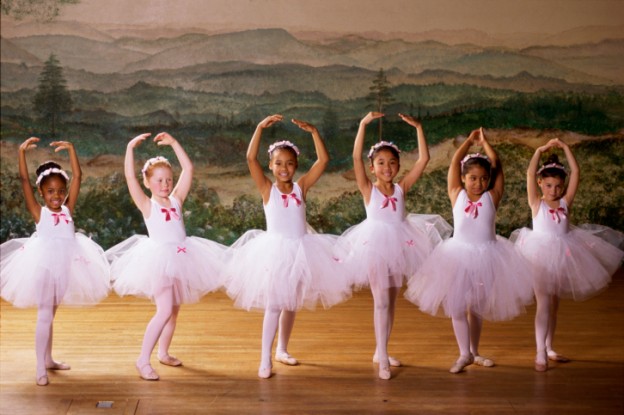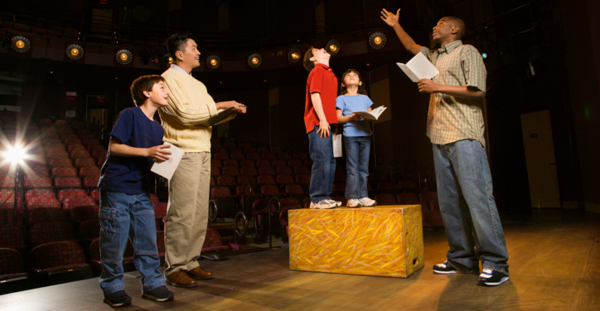
Resources  Singing is first considered beneficial from an articulation and projection standpoint. If actors do not speak clearly and loudly, the audience cannot be entertained. From this viewpoint when exploring singing on stage with students, focus on strong communication with games designed to heighten these skills.
Secondly, incorporate hand motions into songs, or better yet, if you have access to American Sign Language, introduce those skills as well. This creates access to all communication modalities and for more advanced students, the dual communication method is an enjoyable learning challenge.
Singing is first considered beneficial from an articulation and projection standpoint. If actors do not speak clearly and loudly, the audience cannot be entertained. From this viewpoint when exploring singing on stage with students, focus on strong communication with games designed to heighten these skills.
Secondly, incorporate hand motions into songs, or better yet, if you have access to American Sign Language, introduce those skills as well. This creates access to all communication modalities and for more advanced students, the dual communication method is an enjoyable learning challenge.
 Acting is great source of recreational therapy. It involves teamwork, communication, eye contact and other helpful skills such as facing toward the audience and positive body language. Additionally, acting provides freedom in exploring different worlds of expression.
At its core, acting is practicing social skills during rehearsal and in the performance. One must make eye contact, speak loudly and clearly, interact with others on stage and wait for the other person to finish talking before speaking one’s line(s). These important life skills are presented within the immersion of a fun and challenging experience.
Acting is great source of recreational therapy. It involves teamwork, communication, eye contact and other helpful skills such as facing toward the audience and positive body language. Additionally, acting provides freedom in exploring different worlds of expression.
At its core, acting is practicing social skills during rehearsal and in the performance. One must make eye contact, speak loudly and clearly, interact with others on stage and wait for the other person to finish talking before speaking one’s line(s). These important life skills are presented within the immersion of a fun and challenging experience.
 Dancing in and of itself, dancing is a terrific form of exercise, as well as helping to create an enhanced awareness of the body. Movements of isolation allow opportunities for exploration and knowledge on how your body moves.
Also, in the theatre dance is more effective when combined with singing, or acting. Introverted students who may be hesitant to begin acting, often embrace dancing as a different character, say as a polar bear or monkey, to music. This encourages a comfortable and ‘safe’ avenue of introducing them to the concept of being in character. Similarly, if singing is not one’s forte, dancing to music encourages a successful experience by imagining oneself as a different, albeit temporary, character.
Dancing in and of itself, dancing is a terrific form of exercise, as well as helping to create an enhanced awareness of the body. Movements of isolation allow opportunities for exploration and knowledge on how your body moves.
Also, in the theatre dance is more effective when combined with singing, or acting. Introverted students who may be hesitant to begin acting, often embrace dancing as a different character, say as a polar bear or monkey, to music. This encourages a comfortable and ‘safe’ avenue of introducing them to the concept of being in character. Similarly, if singing is not one’s forte, dancing to music encourages a successful experience by imagining oneself as a different, albeit temporary, character.
 Even with adequate preparation and rehearsal, an understandable bit of nervous excitement is present in all thespians before the curtain rises. And yet, when presented in a fun and engaging manner, most students challenging themselves, summoning a depth of courage, by stepping on stage and saying their lines. The performance and determination of young thespians leaves nary a dry eye in the audience. Thunderous applause and standing ovations leave the students smiling and already prepping for their next production.
About the Author
Katie Mann is the co-founder of the 4th Wall Theatre Company, A non profit organization that provides mobile services and lesson plans for students with all abilities, stretching and leading to growth in confidence and skill, while having a great time. Katie is trained as a Certified Teacher, American Sign Language Instructor and a Choreographer & Program Designer.
Even with adequate preparation and rehearsal, an understandable bit of nervous excitement is present in all thespians before the curtain rises. And yet, when presented in a fun and engaging manner, most students challenging themselves, summoning a depth of courage, by stepping on stage and saying their lines. The performance and determination of young thespians leaves nary a dry eye in the audience. Thunderous applause and standing ovations leave the students smiling and already prepping for their next production.
About the Author
Katie Mann is the co-founder of the 4th Wall Theatre Company, A non profit organization that provides mobile services and lesson plans for students with all abilities, stretching and leading to growth in confidence and skill, while having a great time. Katie is trained as a Certified Teacher, American Sign Language Instructor and a Choreographer & Program Designer.
The Benefits of Theatre for Individuals with Special Needs
To many of us, with or without special needs, the thought of acting, of standing in front of an audience, playing a role, speaking lines, wearing a costume and demonstrating Sign Language is far from our comfort zones.
Often however, once we’ve learned a few tips, been taught encouraging coping skills and have a chance to showcase our new-found knowledge within a safe environment, much of our stage fright can be controlled as our comfort level rises in multiple settings, especially when speaking before a group of people.Theatre Therapy
For those with special needs, increasing one’s comfort level is where theatre therapy provides opportunities to stretch and grow; not only in speaking within larger groups, but expanding life enhancing skill sets as well. Immersion in theatre, into a such a creative and dynamic learning environment strengthens life and social skills. By engaging in unique and fun new experiences, which is itself a terrific form of exercise and self-expression; nearly all aspects of life are positively impacted. Additionally, theatre lends itself for incorporation into any setting; school (Science, or Math lessons), extracurricular activities, at home and...well, anywhere.Three tenets of theatre:
The theatre has three tenets, or aspects; singing, acting and dancing. Each of these areas contain specific skills and opportunities for growing and learning. They overlap in creating a beautiful whole. While nearly everyone favors one theatre arm over another., that’s actually a good thing, leading to confidence building and increased self-esteem by starting with one tenet of theatre and then growing stronger in another. Particularly for those with special needs, each tenet of the theatre is multi-dimensional in enhancing life skills:1. Singing
 Singing is first considered beneficial from an articulation and projection standpoint. If actors do not speak clearly and loudly, the audience cannot be entertained. From this viewpoint when exploring singing on stage with students, focus on strong communication with games designed to heighten these skills.
Secondly, incorporate hand motions into songs, or better yet, if you have access to American Sign Language, introduce those skills as well. This creates access to all communication modalities and for more advanced students, the dual communication method is an enjoyable learning challenge.
Singing is first considered beneficial from an articulation and projection standpoint. If actors do not speak clearly and loudly, the audience cannot be entertained. From this viewpoint when exploring singing on stage with students, focus on strong communication with games designed to heighten these skills.
Secondly, incorporate hand motions into songs, or better yet, if you have access to American Sign Language, introduce those skills as well. This creates access to all communication modalities and for more advanced students, the dual communication method is an enjoyable learning challenge.
2. Acting
 Acting is great source of recreational therapy. It involves teamwork, communication, eye contact and other helpful skills such as facing toward the audience and positive body language. Additionally, acting provides freedom in exploring different worlds of expression.
At its core, acting is practicing social skills during rehearsal and in the performance. One must make eye contact, speak loudly and clearly, interact with others on stage and wait for the other person to finish talking before speaking one’s line(s). These important life skills are presented within the immersion of a fun and challenging experience.
Acting is great source of recreational therapy. It involves teamwork, communication, eye contact and other helpful skills such as facing toward the audience and positive body language. Additionally, acting provides freedom in exploring different worlds of expression.
At its core, acting is practicing social skills during rehearsal and in the performance. One must make eye contact, speak loudly and clearly, interact with others on stage and wait for the other person to finish talking before speaking one’s line(s). These important life skills are presented within the immersion of a fun and challenging experience.
3. Dancing
 Dancing in and of itself, dancing is a terrific form of exercise, as well as helping to create an enhanced awareness of the body. Movements of isolation allow opportunities for exploration and knowledge on how your body moves.
Also, in the theatre dance is more effective when combined with singing, or acting. Introverted students who may be hesitant to begin acting, often embrace dancing as a different character, say as a polar bear or monkey, to music. This encourages a comfortable and ‘safe’ avenue of introducing them to the concept of being in character. Similarly, if singing is not one’s forte, dancing to music encourages a successful experience by imagining oneself as a different, albeit temporary, character.
Dancing in and of itself, dancing is a terrific form of exercise, as well as helping to create an enhanced awareness of the body. Movements of isolation allow opportunities for exploration and knowledge on how your body moves.
Also, in the theatre dance is more effective when combined with singing, or acting. Introverted students who may be hesitant to begin acting, often embrace dancing as a different character, say as a polar bear or monkey, to music. This encourages a comfortable and ‘safe’ avenue of introducing them to the concept of being in character. Similarly, if singing is not one’s forte, dancing to music encourages a successful experience by imagining oneself as a different, albeit temporary, character.
Showtime!
 Even with adequate preparation and rehearsal, an understandable bit of nervous excitement is present in all thespians before the curtain rises. And yet, when presented in a fun and engaging manner, most students challenging themselves, summoning a depth of courage, by stepping on stage and saying their lines. The performance and determination of young thespians leaves nary a dry eye in the audience. Thunderous applause and standing ovations leave the students smiling and already prepping for their next production.
About the Author
Katie Mann is the co-founder of the 4th Wall Theatre Company, A non profit organization that provides mobile services and lesson plans for students with all abilities, stretching and leading to growth in confidence and skill, while having a great time. Katie is trained as a Certified Teacher, American Sign Language Instructor and a Choreographer & Program Designer.
Even with adequate preparation and rehearsal, an understandable bit of nervous excitement is present in all thespians before the curtain rises. And yet, when presented in a fun and engaging manner, most students challenging themselves, summoning a depth of courage, by stepping on stage and saying their lines. The performance and determination of young thespians leaves nary a dry eye in the audience. Thunderous applause and standing ovations leave the students smiling and already prepping for their next production.
About the Author
Katie Mann is the co-founder of the 4th Wall Theatre Company, A non profit organization that provides mobile services and lesson plans for students with all abilities, stretching and leading to growth in confidence and skill, while having a great time. Katie is trained as a Certified Teacher, American Sign Language Instructor and a Choreographer & Program Designer.


